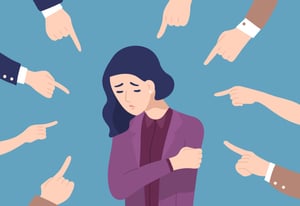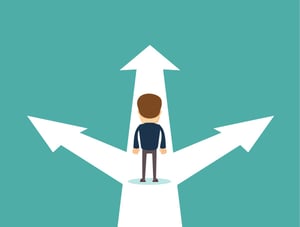
Today, you should give yourself forgiveness.
Why? Because to start off, we know that judgment is self-condemnation and self-forgiveness is freedom.
I'll say that again: Judgment is self-condemnation and self-forgiveness is freedom.
So, it's pretty important. If we want to feel free in our lives, we need to learn how to go about offering ourselves forgiveness.
What is Self Forgiveness?
But before we dive into the how, let's clarify our terms here.
What do we mean by self-forgiveness?
"Self-forgiveness is the process by which we release ourselves for the judgments that we hold against ourselves, because when we accept that we are the ones holding the judgment, we also see that we are the ones who can release it, and we are the ones who can set ourselves free." -- Joe Koelzer, Co-Founder, The Clearing
So that's the essence of self-forgiveness. It's realizing that the door feels locked, but we're the ones who have the keys in our hands. It's actually very empowering. This is a process that you can learn. And I'm going to share the step-by-step actions that you can take, but ultimately, this is within yourself. This is something only that you can offer to yourself.
Self Forgiveness Does Not Absolve Personal Responsibility
So, a couple of quick caveats, because you may be thinking, "This all sounds too easy. Where does personal responsibility come into it?"
Just to clarify what self-forgiveness doesn't mean:
- It doesn't mean that everything you've ever done is fine, perfectly okay, with no consequences. Actions do have consequences.
- It doesn't mean that you've never made a mistake. Rather, it's about offering compassion to your past self, the self that made the mistake, and paving the way for a better future, because really, that's the only thing that we can do.
Shame and Addiction
And we actually know, both from our own experience and from the addiction research, that shame and addiction go hand in hand.

Experiences of shame and addiction—resulting from trauma or just as a result of absorbing the cultural messages that we're not good enough—are very strongly linked.
If you have a lot of shame, there's a much higher chance that you will develop some kind of substance or behavioral addiction.
So, self-forgiveness is a powerful antidote to the shame, and therefore, a powerful way to prevent and treat addiction.
Shame and Mental Health
So, I also want to clarify that self-forgiveness is for everyone.
It's not just if you're struggling with addiction.
It can also be extremely helpful if you're dealing with mental health concerns, such as depression, anxiety, and trauma.
The brilliant author Elizabeth Gilbert has a wonderful essay on forgiveness, in which she illuminates the benefits.
She talks about how when you can't forgive yourself, you are stuck in a constant debilitating, draining cycle of self-blame. She says it really beautifully:
“Here is the mantra of the person who cannot forgive herself: ‘You should have known better. You should have known better. You should have known better.’”
She writes about how she was furious at herself for not knowing something before she knew it, but if you really stop and think about that for a minute, does it make sense for you to abuse yourself for not having known something before you knew it? Gilbert writes about how this is unfair to yourself, and thought it may sound simplistic, you cannot know something before you know it.
So, your present self may judge your past self, and think, "Oh my gosh, she should have known better. What was she thinking?"
But the truth of the matter is the past happened, and you knew what you knew.
You didn't know better until you did, and that solid ground is where you stand now, and that's what you live with going forward.
The good news is that while you can't exactly go back and redo your past, you can change it in the sense that your present self can offer compassion to your past self, and therefore, you can impact your past self through the medium of your present self. Pretty cool trick.
Some Practical Self Forgiveness Exercises
Here are some practical, real-world steps to follow if you want to do this and offer yourself forgiveness.
1. Get Centered
The first step is, as always, to center yourself in your loving heart.
If you've never done that, what that means is that you tap into a feeling of oneness, a feeling of connectedness and compassion. And to start, it doesn't have to be toward yourself, if that feels too difficult.
For me, a place I like to begin is with animals, actually, because that feels very safe for me. So I'll think about my cat. I'll think about my family's dog growing up. It's really easy for me to summon this feeling of love and connection towards those animals, towards those pets. It could also be a best friend that you've had your whole life, someone who you feel loves you unconditionally.
2. Identify Judgments
Once you have that sensation of being centered in your loving heart, then you identify the judgments that you've held against yourself.
Judgments are the statements that are causing you mental and emotional pain, and they are the things that you hold against yourself. So, as an example, maybe it's, "I should never have driven drunk. That was so stupid of me."
Write these down.
3. Forgive that Judgment
The next step is to really forgive that judgment that you hold against yourself.
You might write, "I forgive myself for judging myself as stupid, and the truth is _______," and then you put in that blank what love would say, what connection and compassion would say about you.
And maybe the truth is that you were doing the best you could in that moment, at that time. Maybe the truth is that you were in a lot of pain and you made a poor choice, and maybe the truth is that you've learned from it and that you're not the same person now that you were then. Play with it and see what feels true for you.
To learn more on managing judgments, check out the video below:
The Discovery of Choices
 Another truth is that you have choices.
Another truth is that you have choices.
That’s a powerful truth.
As spiritual teacher Byron Katie talks about, if you truly believe that you don't have another option, then oftentimes, you will do things that you'll look back on and think, "How could I have been so stupid? How could I have done that?"
But in that moment, you truly didn't see another way out.
You didn't understand all of the infinite possibilities that were available to you. And so given the limited number of options you saw, you made the best choice that you knew how to make, even if in hindsight, you're thinking, "Man, of all the options, why'd I pick that one?" Because it was the only one you saw in that moment. If you would have seen a better option, and a healthier option, and felt that you could move toward that, you would have moved toward that.
Removing The Limiting Beliefs that Keep You Stuck
Another key self forgiveness exercise involves using the same process with the limiting beliefs that you have against yourself. {what are limiting beliefs?}
Examples of Limiting Beliefs
So, one might be, "I'm a total loser," so again, you use the same framework. "I forgive myself for accepting the limiting belief that I'm a total loser, and the truth going forward for me is that I'm infinitely valuable and infinitely loved." Of course, fill in the blank with what you feel rings true, but that's just one that popped up for me.
You'll also be able to tell a limiting belief because it will feel painful when you say it and when you think it. It will feel constricting, binding, and yes, limiting.
Examples could be:
- I'm a screw up.
- I can't tell anyone.
- I can't trust anyone.
- I will never achieve this.
- I am not worthy of love.
- I am not a good person.
Offering Love to The Parts Of Yourself That Hurt
To bring this all home, the purpose and the point of self-forgiveness is offering compassion to the vulnerable parts of yourself.
It's offering love to the parts of yourself that hurt. Because when you realize that you have the power to offer yourself forgiveness, you see that you have all these different aspects of yourself.
You have the aspect that's doing the judging, and then you have the aspect that is in pain because of the judgment.
But, the amazing thing about self-forgiveness is that you also have the part of yourself that watches both of those parts, and is sort of above and beyond those other parts.
That is the part of you that is tapped into spirit, into life, into the universe, into God, and that part of you can offer forgiveness to the other parts of you. It's all you, but it all works together in a beautiful and mysterious way.
I dare you to try this.
It’s one thing to hear someone else describe it. But if you actually sit and get still, and practice offering yourself forgiveness, that’s when you’ll experience something profound.
--
For more about the underlying causes of addiction, download our free eBook:



